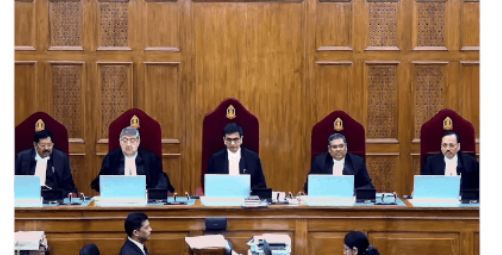In August 2019, India’s ruling Bharatiya Janata Party (BJP) had revoked occupied Kashmir’s special status
Agencies
New Delhi: India’s Supreme Court on Monday ruled in a unanimous verdict that the special status of held Kashmir was a temporary provision and upheld the order abrogating Article 370 in the constitution, Indian Media reported.
It also directed the election commission to hold elections in held Kashmir by September 30, 2024.
In August 2019, India’s ruling Bharatiya Janata Party (BJP) had revoked occupied Kashmir’s special status by repealing Article 370 of the constitution. The law had limited the power of the Indian parliament to impose laws in the state, apart from matters of defence, foreign affairs and communications.
The move allowed people from the rest of the country to have the right to acquire property in held Kashmir and settle there permanently.
Kashmiris, international organisations and critics of India’s Hindu nationalist-led government had termed the move an attempt to dilute the demographics of Muslim-majority Kashmir with Hindu settlers.
A five-member bench headed by Chief Justice of India (CJI) D.Y. Chandrachud had begun hearing the set of petitions challenging the reading down of Article 370 of the Indian constitution on on July 11 and reserved its verdict on September 5.
The move was challenged by the region’s pro-India political parties, the local Bar Association and individual litigants. The pleas, including those filed by the National Conference and the People’s Democratic Party, had also challenged India-held Kashmir’s bifurcation into two union territories.
Today, CJI read out the operative part of the verdict written by him for himself and Justices B R Gavai and Surya Kant, Indian media reported. Justices Sanjay Kishan Kaul and Sanjiv Khanna wrote separate but concurrent judgments.
CJI Chandrachud observed the petitioners’ contention that the centre could not take any decision during proclamation under Article 356 was not acceptable, Indian media said.
“Article 370 of the Constitution was an interim arrangement due to war conditions in state. Constituent assembly of Jammu and Kashmir was never intended to be permanent body,” CJI Chandrachud was quoted as saying.
The 2019 declaration was “a culmination of the process of integration and as such is a valid exercise of power”, the court said in its verdict.
The Indian apex court said occupied Kashmir did not retain the element of sovereignty after joining India. It further said it did not need to adjudicate on the validity of the presidential proclamation in the region as the petitioners had not challenged it.
According to the report, the ruling also termed petitioners’ arguments that the union government cannot take actions of irreversible consequences in the state during presidential rule as unacceptable.
Noting that Article 370 was a temporary provision, the SC said India-held Kashmir became an “integral part” of the country as reflected in Articles 1 and 370 of its constitution.
The CJI observed that Article 370 was meant for constitutional integration of the region with the union and not for disintegration, and that the President can declare that the said article ceases to exist.
The SC also upheld the reorganisation of Ladakh as a union territory.
The apex court also directed the country’s election commission to take steps to conduct elections for legislative assembly, Indian media stated.
It ordered that India-held Kashmir be restored to the same statehood as any other Indian state — with no separate autonomy rights — “at the earliest and as soon as possible”.
Remarking that the people of occupied Kashmir “went through a lot and wounds need healing”, Justice Kaul directed that a truth and reconciliation commission be set up to probe human rights violations by state and non-state actors since the 1980s, the report said.
Reacting to the order, Indian Prime Minister Narendra Modi termed the verdict a “beacon of hope” and said it “constitutionally upholds the decision taken by the Parliament of India on Aug 5, 2019”.
Meanwhile, senior Congress leader Karan Singh said a section of the people in occupied Kashmir “will not be happy with this judgment”.
Former prime minister Shehbaz Sharif said the Indian SC had “violated the international laws by giving a decision against the resolutions of the United Nations”.
Stating that the court has “betrayed the sacrifice of millions of Kashmiris”, Shehbaz asserted the verdict will be seen as a “recognition of the murder of justice”.
Former chief minister of held Kashmir Mehbooba Mufti termed the verdict nothing less than a death sentence for Mahatma Gandhi’s “idea of India”.
In a video message on X, she urged Kashmiris not to lose hope or get disheartened because this wasn’t their final destination but only a mere obstacle.
“Don’t make the mistake of accepting the Supreme Court decision as your destiny,” Mufti added. “We have seen many ups and downs. Our rivals want us to lose hope, get disheartened, and accept defeat but this won’t happen.”
The former CM termed the decision as a defeat for the country as it weakened it. “You have broken the hand that shook yours in 1947.”
“The way the Muslims of Kashmir along with the Sikhs and Buddhists bid adieu to Pakistan and chose to join hands with Gandhi’s India,” Mufti said. “It is the defeat of that ‘idea of India’ today.”
Ahead of the verdict’s announcement, she and Omar Abdullah, the president of the PDP and the National Conference — petitioners in the case — were put under house arrest, Indian media reported.

















